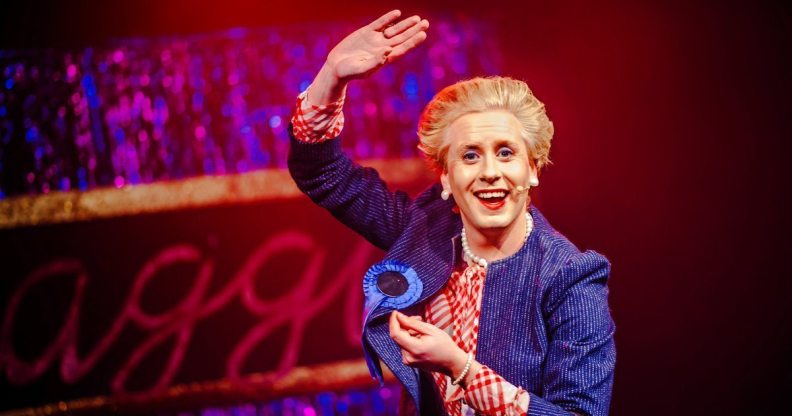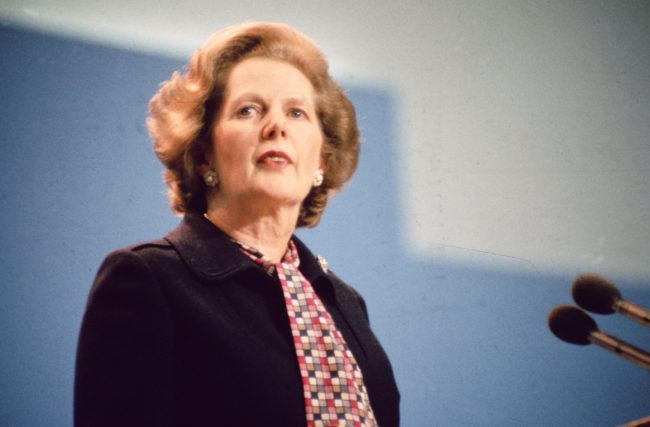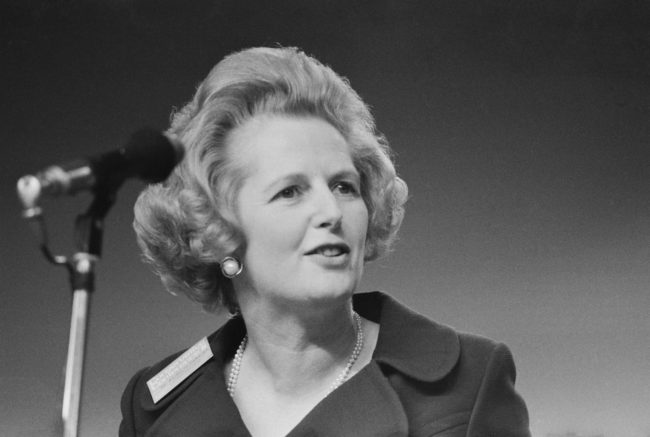This is the real reason I’m a Margaret Thatcher drag queen

Matt Tedford, who performs as Margaret Thatcher Queen of Soho, explains why he was moved to turn one of the UK’s most reviled Prime Ministers into his drag persona.
Five years ago my best friend asked me if I wanted to co-write and star in a drag comedy musical about Margaret Thatcher.
We began writing immediately and he started asking me lots of questions: What was my opinion of Maggie? What did I hate or admire about her? What Thatcher policies had had the biggest effect on me?
That last question was the easiest to answer.
I was born in 1987. It was the height of the AIDS crisis with one person dying every day of the disease. It was the year of the ‘Don’t Die of Ignorance’ campaign with its volcanoes and giant tombstones. It was also the year a clause was introduced into a bill in Parliament, that would later become known as Section 28.
For those of you in iGen, Section 28 was an amendment to the Local Authority Act which prohibited the allocation of local government funding to what was deemed to be the promotion of homosexuality. Particularly in schools.

Jeremy Corbyn meets Edinburgh Fringe Festival comedy act Margaret Thatcher Queen of Soho (Photo by Mark Runnacles/Getty Images)
It was brought in by a Government reacting to public hysteria, and fanning it at the same time. After all, if children knew about these alternative lifestyles they’d hunt them out faster than news Pogs on the playground. And so books were banned, sex education was restricted to discussing heterosexual hanky-panky and the only conversations children had about gay sex were on the playground. The law was broad. It scared people, specifically teachers. Many feared that if they were seen to be ‘promoting’ an alternative lifestyle in any way it would result in them being fired.
Of course eventually the law was repealed. But not until 2003. By that point I had lived my entire school life in the shadow of Section 28.
I grew up in an archetypal Northern town. Industrial, predominantly working class, white and Christian. One of the worst things you could be was gay. Being gay meant you were different and different wasn’t good.
If you showed the slightest signs of deviating from the heterosexual norms you were a faggot and probably had AIDS. You were shunned. If another child was seen with you that meant they were gay by association.
What made it even more confusing and scary was that I didn’t even know what I was. Was I gay? Maybe? Or maybe this was the famous ‘phase’ that it was possible to go through? All I knew for sure was that my friend Alison’s older brother was much more attractive than she was. I was different, but I wasn’t going to tell anyone that. In fact I was going to make damn sure no one would ever find out… even if that meant lying to myself.

British Conservative prime minister Margaret Thatcher (Photo by Hulton Archive/Getty Images)
The real consequence of Section 28 was that there was no educated dialogue for young people about sexuality. In sex ed classes, we were taught that an erect penis went into a vagina and nine months later there was a baby. We watched a video where a man’s voice broke as he said ‘Hello’. The girls were taken to a different classroom to learn about periods. That was it.
One of my most vivid memories is of a teacher being asked about gay sex. They responded: “I’m not allowed to answer that”.
I can still remember the cold sweat rising up my neck. The malice in the answer’s tone may have been purely imagined, but to me it was said with earnest intent. Sex of this kind was obviously so awful and so forbidden even a teacher wouldn’t dare speak of it. This was not allowed.
Hardly anyone has a fairy-tale high school experience. Teenagers are cruel. Secondary education can sometimes resemble a particularly brutal David Attenborough special; the hunters separate the weak from the pack and pursue them until blood is drawn. I was called it all:
Queer.
Puff.
Faggot.
Pervert.
Drawing attention to yourself in any way was a red flag that you were prey, and so I disappeared into myself.
This rising anxiety did not just manifest internally. Amongst my peers I was quiet until provoked, and then I was mean. I turned into a bully. My defensive was very much an offensive. If I got it, I gave it back, but not always to the person attacking me. After all, if I could make them laugh at someone else then they wouldn’t be laughing at me. I don’t excuse my behaviour. I’d just been shown that attacking someone for who they were was fair game.

Margaret Thatcher (Photo by William Lovelace/Daily Express/Getty Images)
Thank God for TV! Now, every time I see a new LGBTQ+ character being introduced to a soap or sitcom I remember how far public perception has come. My only experience of gay men on telly was Mr Humphries and he wasn’t exactly out and proud.
The big moment for me was watching Queer as Folk. Pure scandal. I watched it alone, sat in front of the TV with the sound turned down and one finger against the ‘channel up’ button. After all, what would happen if someone came in and saw what I had been watching? I had no idea what was going on, but here were the first gay people with rounded personalities I had ever encountered. It was revolutionary! I mean, rimming?! On TV?! That blew my mind!
It wasn’t until I went to university that I actually met other gay people. I still wasn’t out myself, but there were two gay men on my course who were, and I was utterly fascinated by them. I had so many questions! I wanted to know how they came out, how their parents reacted, what they did sexually, how they lived with it – how they were able to be gay?!
I didn’t really come out the closet, it fell down around me while I tried to hold it up. Looking back, I wish I had had the confidence to be open about my sexuality from my first day. But I got there. No one was surprised. No one was outraged. No one loved me less.
I was relieved. But I didn’t stop thinking about it.
When we started writing Margaret Thatcher Queen of Soho, we quickly centred it around the events leading up to the passing of Section 28.
We wanted to cover it all – the moral panic, the protests, the debates in Parliament – but we didn’t want to tell the story in a po-faced way (which would have been difficult, when Maggie’s being played as a disco singing, sequined throwing, diva superstar). Instead we decided to tell a fantasy story about what would have happened if Maggie had had a change of heart, if she had embraced gay rights, if Section 28 had not passed.
How different things could have been.
Obviously today we are eons away from where we were. Gay people can get married, adopt, their rights are enshrined in law, we have gay vicars, a gay leader of the Conservative Party in Scotland, even a gay member of the royal family – a minor one, but it’s a start. Last month the Secretary of State for Education gave assurances to the House that the new compulsory provisions for sex education in schools would be LGBTQ+ inclusive. Obviously there is still much work to be done – especially in terms of trans rights and for POC within the gay community – but no one can deny that we’ve come a long way.
And yet I can’t help thinking that although things have changed, in many ways they haven’t.
A lot of people say they don’t care if their child is gay.
But they’re wrong – you should care.
Your child is going to have a different experience of life. They are going to go through hardships that you may not have. They will experience prejudice. They may experience shame. You’re going to have to have different conversations. You need to educate yourself. You need to care. We need these conversations in order to have equality.
I’ve been performing the show now for almost five years. I think it’s very important that people know about this chapter in our history. It would be very easy to take all this progress for granted and forget there ever was a thing called Section 28. But that would be wrong. We need to remember how easy it is to give into prejudice and how terrible the effects can be for our children.
I want people to know I exist. I want teachers to be able to answer questions in class. I want young gay men and women to know that who they are and the things they are feeling are normal. I don’t want anyone else to have to watch TV with their finger on the off button, I don’t want anyone else to bully other people because they can’t accept who they are, I don’t want anyone else to feel ashamed.
Section 28 stopped people talking about it. We need to make sure we never stop talking about it again.
Margaret Thatcher Queen of Soho is currently playing at the Vault Festival in London.

